Fifty-Fifty O'Brien (9 page)
Read Fifty-Fifty O'Brien Online
Authors: L. Ron Hubbard

Suddenly the thing was closed. Hardesty snatched at the bars and pulled them across. A moment later, he sagged back, glowing with the knowledge that he had won.
The machine gun roared above them. Death smashed into the pass. A Chauchat started up with its hysterical clatter. They were clearing the pass with enfilade fire. Grenades exploded down on the incline, setting the night on fire with their blinding flashes.
Abruptly everything was still. A murmur started along the embrasure. The murmur grew and became a shout. Kaslov looked at Hardesty and said, “You got a cigarette?”
Hardesty handed one over and lighted it for the Russian. Kaslov dragged thankfully at it and then dug in his tunic for a flat bottle. The warmth of the fluid slid easily down Hardesty's throat.
After Kaslov had taken a drink, he wiped his lips with the back of his hand and said, “About those empties. Was that right? Did they leave a pattern around me?”
Hardesty laughed. “It was a good story, wasn't it?”
Kaslov chuckled, then sobered. “Too bad he got away, wasn't it?”
“Wasn't it?” said Hardesty. He swung back the small inner door and pointed out. Kaslov looked through and grunted.
Riddled by the first burst, and sprawled in death amid the tribesmen, lay Corporal Bereaux, victim of ideas. Even in the pale moonlight they could see that the sand beneath the body was turning red.
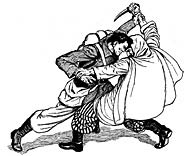
Story Preview
N
OW
that you've just ventured through some of the captivating tales in the Stories from the Golden Age collection by L. Ron Hubbard, turn the page and enjoy a preview of
The Iron Duke.
Join Blacky Lee, a man wanted by nearly every government in Europe, who happens to be the spitting image of a leader in the Balkan kingdom of Aldoria. With nowhere else to hide, the enterprising Lee flees to Aldoria and attempts to make the most of his mistaken identity in a startling tale of intrigue, humor and romance.
The Iron Duke
S
TUB
always had an uneasy feeling about Blacky Lee. Stub's state of mind was that of a man watching another holding a
cannon cracker
and not knowing just when he'd let that cracker explode. At least once a day Stub wondered why he had ever allowed himself to become associated with as nerve-racking a fellow as Blacky Lee. One never knew what was going on in Lee's mind and never, never knew just when those thoughts would amalgamate with a bang. And sitting there watching Blacky just now, Stub forgot all about how grateful he was for the warmth in the radiator.
Blacky Lee had come out of his reverie and was now, by aid of his reflection in the glass, carefully twirling his ginger mustache into a pair of military points. Stub, who always ran on the assumption that now, at last, he knew everything about Blacky Lee, was sorely jolted by the little container of mustache wax which Blacky was using. Never in all the years he had been with Blacky had Stub known him to carry wax or use wax, and now, with their baggage abandoned in Austria, a thing as nonsensical as mustache wax was here in Blacky's possession! Certainly Blacky was attempting no disguise, for pointing a mustache would be a very weak attempt in that direction.
Stub gave over wondering. He sighed and rested his little round face in his pudgy hands. “There was such a
nice
bottle of anisette in my trunk,” he sighed. “Do you suppose I'll ever see that bottle again, Blacky?”
“Probably never.”
“And that nice new suit with the yellow stripesâ”
“It's probably adorning the porter of the King's Hotelâif his taste in clothes is as bad as yours.”
“Gosh! You really think so, Blacky?”
“You're lucky,” said Lee, “not to have that suit full of holesâwith you in back of each hole.”
“Yeah. Yeah, you're always telling me how lucky I am to be alive,” sighed Stub. “You pull me through hell and high dives with one of your ideas, and then when we escape on the razor edge of execution you tell me how lucky I am! I'm not complaining, you understand, but sometimes I think my nerves just won't stand it anymore. Tonight we should have been dining with generals and getting paid real money, but here we are, on a train without tickets, in a country which we didn't enter legally, without so much as an Aldorian dime or a forged birth certificate!”
“You haven't forgotten how to use a pen,” said Lee.
“Yeah, but now I haven't even
got
a pen. Sometimes, Blackyâ”
The train came to a screaming halt, nearly throwing Stub into the middle of the floor. He clutched the sill, staring with terrified eyes at Blacky.
“That conductor saw us. The Austrians figured we'd shuttle across the frontier and snag this
rattler
! Hell's bells, Blacky, what are we going to do now?”
“Sit tight and hope,” said Blacky Lee imperturbably. “It's impossible that they could have extradited us that fast.”
“They'd send word that we were in the country without papers,” groaned Stub. “Blacky, I can hear the rats in the dungeons already!”
Blacky was giving the troops outside the window an interested examination. A patrol, booted and greatcoated, was splashing flashlights along the side of the track and boarding the train at the next car.
“We're in for it now,” said Stub. “And me without so much as a drink!”
Stub twisted his neck so that he could look up the track at the somber figures of the patrol, and then, when he next glanced at Blacky Lee and saw that a 9 mm
Webley
showed its snout from beneath Blacky's folded topcoat, his eyes got big and then narrow. Stub, without sigh or protest, put his hand into his side pocket and gripped the butt of the
Colt Police Positive .38
therein. If Blacky was going to make a fight for it even against a large and well-armed patrol, then it would be a fight.
They sat very still, though there was no perceptible change in Blacky, hearing the patrol going through the cars ahead, hearing the complaints of roused passengers who, having had to stay up to pass through the frontier, now thought they were being slightly imposed upon. The search was coming closer, compartment by compartment.
Their compartment door was thrown open by the trainmaster, who consulted his record so as to address the occupants by name and save them as much embarrassment as he could. The trainmaster's watery eyes came up with a jerk from the record and drilled Blacky Lee.
The lieutenant in charge of the patrol was all business. He had stripped off his great gauntlets and tucked them in his belt, but he had his crop in hand and was cutting nervously at his boots as he waited for the trainmaster to speak up.
“Well?” said the dark-faced lieutenant.
“Your honor,” said the trainmaster, trembling, “I have no record of the two gentlemen in there.”
“Ah!” And the lieutenant, with all the savor of a bloodhound at last treeing his quarry, thrust himself into the room, one hand resting on the butt of his gun.
Stub was waiting for the shot that would start the war. He could see the troopers in the corridor and the dull gleam of their
carbines
, and he knew how slight were his chances. But he had an accurate bead upon the lieutenant's greatcoat, third button from the top.
The lieutenant's smile of triumph suddenly congealed upon his face and then, from the eyes down, there dropped a curtain of fumbling terror. This, in turn, was swept away by a stolid parade-ground expression and looking straight ahead, his heels close together, the lieutenant spoke.
“My apologies, Your Highness. We are searching for one Balchard, leader of the Sons of Freedom, reported to have been on this train. My stupidity, Your Highness, is only that of zeal. May I be granted the favor of remaining aboard and posting adequate guard over your compartment?”
“I do not care,” said Blacky Lee, “to have attention called to my presence aboard the Trans-Balkan Express. You are excused, Lieutenant. Carry on.”
The lieutenant, embarrassed, about-faced and marched out. Angrily he motioned his men from the corridor.
The trainmaster stood blinking and peering, stupefied, and undoubtedly promising himself a new set of glasses, pride or no pride, at the next stopover.
“Is ⦠is there anything Your Highness could wish, sire?”
“Yes,” said Blacky Lee. “A bottle of anisette for my friend and a ham sandwich for myself.”
“Immediately, Your Highness.” And he stumbled away.
Stub looked, slack-jawed, at Blacky Lee, finding it difficult to force a question out of his constricted throat.
“Your Highness?” gulped Stub. “Heâthey called you âYour Highness'!”
Blacky Lee smiled enigmatically and slid the Webley 9 mm into his side pocket. The train had started again and he sank back, staring thoughtfully out of the window at the flying night.â¦
To find out more about
The Iron Duke
and how you can obtain your copy, go to
www.goldenagestories.com
.
Your Next Ticket to Adventure
Discover Intrigue and Romance in Aldoria!
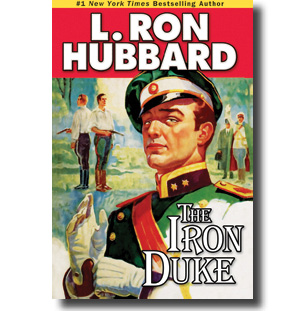
B
lacky Lee is a lady's man, a man's manâand a wanted man, on the run in 1930s Europe, a price put on his head by the Nazis. Think Clark Gableâwith larceny in his heart and a price on his head. But Blacky's always got an angleâthis time he'll impersonate
The Iron Duke,
crowned head of a Balkan kingdom. He could win it allâthe love of a country and a beautiful womanâif he's willing to
risk
it all.
Get in on the deception as the audio version of
The Iron Duke
puts you in the middle of the royal con game.
Get
The Iron Duke
C
ALL
TOLL
-
FREE
: 1-877-8
GALAXY
(1-877-842-5299)
OR GO ONLINE TO
www.goldenagestories.com
Galaxy Press, 7051 Hollywood Blvd., Suite 200, Hollywood, CA 90028
L. Ron Hubbard in the
Golden Age of
Pulp Fiction
Â
I
n writing an adventure story
a writer has to know that he is adventuring
for a lot of people who cannot.
The writer has to take them here and there
about the globe and show them
excitement and love and realism.
As long as that writer is living the part of an
adventurer when he is hammering
the keys, he is succeeding with his story.
Adventuring is a state of mind.
If you adventure through life, you have a
good chance to be a success on paper.
Adventure doesn't mean globe-trotting,
exactly, and it doesn't mean great deeds.
Adventuring is like art.
You have to live it to make it real.
â L. Ron Hubbard
L. Ron Hubbard
and American
Pulp Fiction
B
ORN
March 13, 1911, L. Ron Hubbard lived a life at least as expansive as the stories with which he enthralled a hundred million readers through a fifty-year career.
Originally hailing from Tilden, Nebraska, he spent his formative years in a classically rugged Montana, replete with the cowpunchers, lawmen and desperadoes who would later people his Wild West adventures. And lest anyone imagine those adventures were drawn from vicarious experience, he was not only breaking broncs at a tender age, he was also among the few whites ever admitted into Blackfoot society as a bona fide blood brother. While if only to round out an otherwise rough and tumble youth, his mother was that rarity of her timeâa thoroughly educated womanâwho introduced her son to the classics of Occidental literature even before his seventh birthday.
But as any dedicated L. Ron Hubbard reader will attest, his world extended far beyond Montana. In point of fact, and as the son of a United States naval officer, by the age of eighteen he had traveled over a quarter of a million miles. Included therein were three Pacific crossings to a then still mysterious Asia, where he ran with the likes of Her British Majesty's agent-in-place for North China, and the last in the line of Royal Magicians from the court of Kublai Khan. For the record, L. Ron Hubbard was also among the first Westerners to gain admittance to forbidden Tibetan monasteries below Manchuria, and his photographs of China's Great Wall long graced American geography texts.
Upon his return to the United States and a hasty completion of his interrupted high school education, the young Ron Hubbard entered George Washington University. There, as fans of his aerial adventures may have heard, he earned his wings as a pioneering barnstormer at the dawn of American aviation. He also earned a place in free-flight record books for the longest sustained flight above Chicago. Moreover, as a roving reporter for
Sportsman Pilot
(featuring his first professionally penned articles), he further helped inspire a generation of pilots who would take America to world airpower.
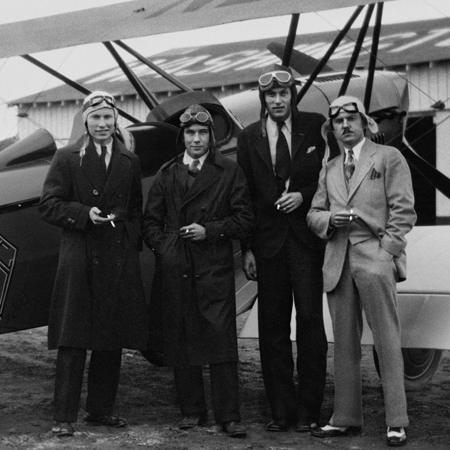
L. Ron Hubbard, left, at Congressional Airport, Washington, DC, 1931, with members of George Washington University flying club.
Immediately beyond his sophomore year, Ron embarked on the first of his famed ethnological expeditions, initially to then untrammeled Caribbean shores (descriptions of which would later fill a whole series of West Indies mystery-thrillers). That the Puerto Rican interior would also figure into the future of Ron Hubbard stories was likewise no accident. For in addition to cultural studies of the island, a 1932â33 LRH expedition is rightly remembered as conducting the first complete mineralogical survey of a Puerto Rico under United States jurisdiction.
There was many another adventure along this vein: As a lifetime member of the famed Explorers Club, L. Ron Hubbard charted North Pacific waters with the first shipboard radio direction finder, and so pioneered a long-range navigation system universally employed until the late twentieth century. While not to put too fine an edge on it, he also held a rare Master Mariner's license to pilot any vessel, of any tonnage in any ocean.

Capt. L. Ron Hubbard in Ketchikan, Alaska, 1940, on his Alaskan Radio Experimental Expedition, the first of three voyages conducted under the Explorers Club Flag.
Yet lest we stray too far afield, there is an LRH note at this juncture in his saga, and it reads in part:
“I started out writing for the pulps, writing the best I knew, writing for every mag on the stands, slanting as well as I could.”
To which one might add: His earliest submissions date from the summer of 1934, and included tales drawn from true-to-life Asian adventures, with characters roughly modeled on British/American intelligence operatives he had known in Shanghai. His early Westerns were similarly peppered with details drawn from personal experience. Although therein lay a first hard lesson from the often cruel world of the pulps. His first Westerns were soundly rejected as lacking the authenticity of a Max Brand yarn (a particularly frustrating comment given L. Ron Hubbard's Westerns came straight from his Montana homeland, while Max Brand was a mediocre New York poet named Frederick Schiller Faust, who turned out implausible six-shooter tales from the terrace of an Italian villa).
Nevertheless, and needless to say, L. Ron Hubbard persevered and soon earned a reputation as among the most publishable names in pulp fiction, with a ninety percent placement rate of first-draft manuscripts. He was also among the most prolific, averaging between seventy and a hundred thousand words a month. Hence the rumors that L. Ron Hubbard had redesigned a typewriter for faster keyboard action and pounded out manuscripts on a continuous roll of butcher paper to save the precious seconds it took to insert a single sheet of paper into manual typewriters of the day.
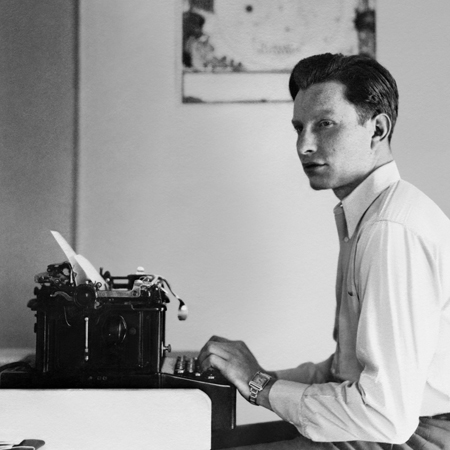
L. Ron Hubbard, circa 1930, at the outset of a literary career that would span half a century.
That all L. Ron Hubbard stories did not run beneath said byline is yet another aspect of pulp fiction lore. That is, as publishers periodically rejected manuscripts from top-drawer authors if only to avoid paying top dollar, L. Ron Hubbard and company just as frequently replied with submissions under various pseudonyms. In Ron's case, the list included: Rene Lafayette, Captain Charles Gordon, Lt. Scott Morgan and the notorious Kurt von Rachenâsupposedly on the lam for a murder rap, while hammering out two-fisted prose in Argentina. The point: While L. Ron Hubbard as Ken Martin spun stories of Southeast Asian intrigue, LRH as Barry Randolph authored tales of romance on the Western rangeâwhich, stretching between a dozen genres is how he came to stand among the two hundred elite authors providing close to a million tales through the glory days of American Pulp Fiction.

A Man of Many Names
Between 1934 and 1950, L. Ron Hubbard authored more than fifteen million words of fiction in more than two hundred classic publications.
To supply his fans and editors with stories across an array of genres and pulp titles, he adopted fifteen pseudonyms in addition to his already renowned L. Ron Hubbard byline.
______
Winchester Remington Colt
Lt. Jonathan Daly
Capt. Charles Gordon
Capt. L. Ron Hubbard
Bernard Hubbel
Michael Keith
Rene Lafayette
Legionnaire 148
Legionnaire 14830
Ken Martin
Scott Morgan
Lt. Scott Morgan
Kurt von Rachen
Barry Randolph
Capt. Humbert Reynolds

In evidence of exactly that, by 1936 L. Ron Hubbard was literally leading pulp fiction's elite as president of New York's American Fiction Guild. Members included a veritable pulp hall of fame: Lester “Doc Savage” Dent, Walter “The Shadow” Gibson, and the legendary Dashiell Hammettâto cite but a few.
Also in evidence of just where L. Ron Hubbard stood within his first two years on the American pulp circuit: By the spring of 1937, he was ensconced in Hollywood, adopting a Caribbean thriller for Columbia Pictures, remembered today as
The Secret of Treasure Island.
Comprising fifteen thirty-minute episodes, the L. Ron Hubbard screenplay led to the most profitable matinée serial in Hollywood history. In accord with Hollywood culture, he was thereafter continually called upon to rewrite/doctor scriptsâmost famously for long-time friend and fellow adventurer Clark Gable.
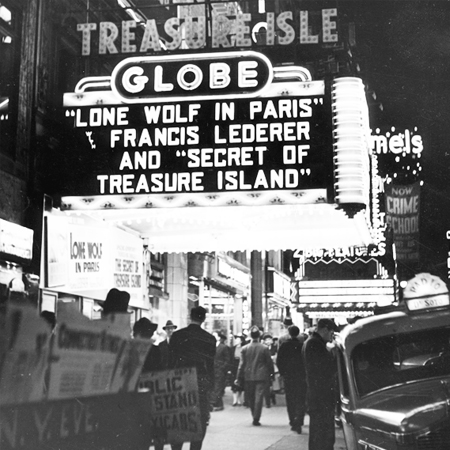
The 1937
Secret of Treasure Island,
a fifteen-episode serial adapted for the screen by L. Ron Hubbard from his novel,
Murder at Pirate Castle
.
In the interimâand herein lies another distinctive chapter of the L. Ron Hubbard storyâhe continually worked to open Pulp Kingdom gates to up-and-coming authors. Or, for that matter, anyone who wished to write. It was a fairly unconventional stance, as markets were already thin and competition razor sharp. But the fact remains, it was an L. Ron Hubbard hallmark that he vehemently lobbied on behalf of young authorsâregularly supplying instructional articles to trade journals, guest-lecturing to short story classes at George Washington University and Harvard, and even founding his own creative writing competition. It was established in 1940, dubbed the Golden Pen, and guaranteed winners both New York representation and publication in
Argosy.
